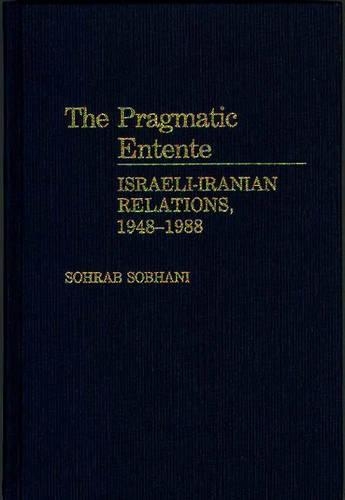
The Pragmatic Entente: Israeli-Iranian Relations, 1948-1988
(Hardback)
Publishing Details
The Pragmatic Entente: Israeli-Iranian Relations, 1948-1988
By (Author) Sohab C. Sobhani
Bloomsbury Publishing PLC
Praeger Publishers Inc
21st September 1989
United States
Classifications
Tertiary Education
Non Fiction
Middle Eastern history
327.5505694
Physical Properties
Hardback
206
Description
This is a comprehensive work on the long-standing yet ever changing relationship between Israel and Iran. It draws on the experience and first-hand accounts of those individuals involved in Israeli-Iranian relations before and after the 1979 arrival of Khomeini in Tehran. It studies this relationship against the complex background of Middle East politics. Sobbani interviews many former Iranian officials and reveals new information explaining why Iran and Israel act the way they do and why their interests have converged over the last 40 years. The book traces the principal trends in the emergence of the relationship between the two countries and identifies the main factors leading to both continuity and change in their relations. Organized in chronological order, "The Pragmatic Entente" concludes with a discussion of future Israeli-Iranian relations, examining the reasons why the Tehran-Tel Aviv axis will continue to be an enduring feature of the Middle Eastern power configuration.
Reviews
. . . It is, on the whole, a thought-provoking study addressing a crucial piece of the Middle East political puzzle. It lays the groundwork for more rigorous research n the complex nature of Israeli-Iranian relations and will benefit students, scholars, and practicioners alike.-Middle East Journal
The strength of Sobhani's work is tied to his broad perspective and his objective analysis. A useful introduction provides a brief overview of Israeli-Iranian relations and focuses on the underlying interests of each state pertinent to its relations with the other. He identifies seven elements that affect Israeli demographic considerations; mutual interests in containing Soviet and Sunni Arab hegemony; trade in agriculture, military technology, and oil; Iranian-Arab and Arab-Israeli relations; Israel's special relationship with the United States; and the nature of Iranian leadership. . . on the whole, a thought-provoking study addressing a crucial piece of the Middle East political puzzle. It lays the groundwork for more rigorous research on the complex nature of Israeli-Iranian relations and will benefit students, scholars, and practitioners alike.-Middle East Journal
." . . It is, on the whole, a thought-provoking study addressing a crucial piece of the Middle East political puzzle. It lays the groundwork for more rigorous research n the complex nature of Israeli-Iranian relations and will benefit students, scholars, and practicioners alike."-Middle East Journal
"The strength of Sobhani's work is tied to his broad perspective and his objective analysis. A useful introduction provides a brief overview of Israeli-Iranian relations and focuses on the underlying interests of each state pertinent to its relations with the other. He identifies seven elements that affect Israeli demographic considerations; mutual interests in containing Soviet and Sunni Arab hegemony; trade in agriculture, military technology, and oil; Iranian-Arab and Arab-Israeli relations; Israel's special relationship with the United States; and the nature of Iranian leadership. . . on the whole, a thought-provoking study addressing a crucial piece of the Middle East political puzzle. It lays the groundwork for more rigorous research on the complex nature of Israeli-Iranian relations and will benefit students, scholars, and practitioners alike."-Middle East Journal
Author Bio
SOHRAB SOBHANI is Adjunct Professor of International Relations at Georgetown University.
